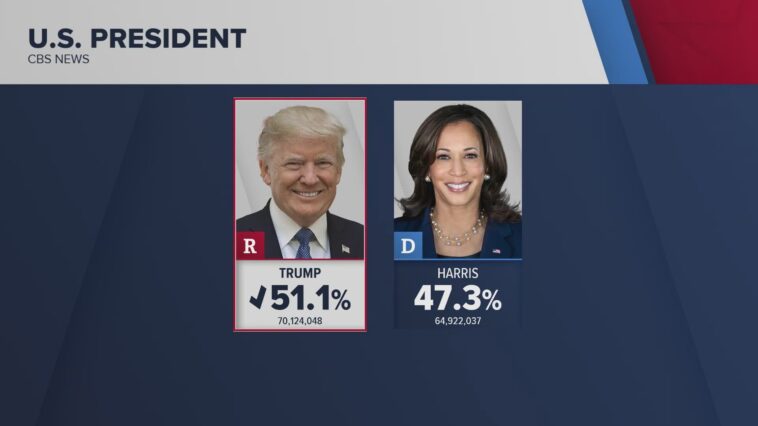Paramount’s capitulation to the demands of President Donald Trump, shelling out a staggering $16 million to mollify a lawsuit over CBS News’ editorial handling of a 60 Minutes segment concerning former VP Kamala Harris, has raised eyebrows across the media landscape. The incident stemmed from the coverage in the lead-up to the 2024 elections. Trump’s representatives have touted this as holding the ‘fake news media’ responsible, while Paramount has been widely criticized for its failure to resist what many deem a groundless legal action. This episode lays bare a growing sense of unease around the issue of press freedom in America.
The backlash against Paramount has been particularly intensified due to the immense partisan divide discernible in the attitudes toward CBS News among sections of the American public. Data from a recent analysis of 30 leading news sources shows a seismic gap: while the Democratic demographic maintains a robust 56% trust in CBS as a reliable news outlet, a mere 23% of Republicans echo such sentiments. It’s hard not to see this yawning disparity playing out in the backlash against the litigation settlement.
This consideration is not merely superficial, either. Paramount is held in the balance of the Federal Communications Commission’s decision to green-light a prospective merger with Skydance Media. This undeniable element of corporate maneuvering turns a critical eye toward the negotiations surrounding the CBS News lawsuit settlement. It is all but impossible to separate the realities of business from the debates in the courtroom, especially when millions of dollars are involved.
This feeds into broader concerns regarding the influence of corporations and government on news agencies. A chunky majority of Americans – 85% and 86% respectively – suspect that financial and political interests exert at least some sway over journalism. Notably, over half of all Americans believe that such influences pack a major punch. Longstanding concerns around corporate bias (55%) and political predisposition (57%) suggest a deep-seated public skepticism that can’t simply be brushed aside.
Meanwhile, President Trump and his GOP counterparts are in the limelight due to their success in sailing a major budget bill across Congressional choppiness. This was not without resistance: a clause that would have offered AI regulations a decadal breather was unanimously tossed overboard by the Senate, leading some to question the hasty decision to limit states’ powers to handle their own regulatory frameworks for AI.
The argument from tech industry figureheads and advocacy groups is that a ‘patchwork’ of individual state restrictions could act as an anchor on technological progress. However, the proponents of the amendment foresaw corporate irresponsibility in the absence of such restrictions, fearing lack of accountability for the potential damages of AI. This opens a Pandora’s Box of questions regarding the balance between innovation and regulation.
In a recent poll, both everyday Americans and AI experts overwhelmingly felt that the current pace of AI regulation falls short of necessity. As the debate rages on, there is an increasingly prevalent sense of concern about the impact of AI on journalism, fueled in part by the noticeable uptick in news site traffic arising from AI-driven bots.
Popularity of AI notwithstanding, broader public sentiment remains skeptical about the technology’s long-term implications for news and the profession of journalism. Almost half believe it will exert a largely negative influence on the nature of news consumed by Americans over the next two decades. Only a small percentage – approximately 10% – anticipate a beneficial effect.
This pessimism spreads into perceptions about the increasing digitization of the media landscape. Streaming services like Netflix, Disney+ and Amazon Prime Video clock up a usage rate of 83% amongst American adults. This high rate of utilization is coupled with the fact that 55% of those surveyed engage with these services without any subscription to traditional cable or satellite TV services.
By contrast, the appetite for cable or satellite subscriptions is waning across the board, with only 36% maintaining such subscriptions. And of these, a paltry 8% persist with tradition and refuse to engage with the newer streaming services at all.
The debate over AI regulation and its implications form part of a broader narrative concerning the rapid technological shift remolding the media landscape. The digital revolution is leaving no corner of the industry untouched, reshaping modes of consumption and challenging traditional conceptions of journalism.
As the Trump lawsuit saga and Paramount’s settlement illustrates, the power dynamics between individual political figures, corporations, and the media can have ground-shaking implications not only for journalistic integrity, but also for public trust in the media.
While the success of Trump’s GOP in passing a major budget bill cannot be ignored, the concurrent regulatory concerns surrounding AI point to a future full of contestation – and one where old guard media entities such as CBS must learn to navigate new waters or risk becoming irrelevant.
The ongoing skepticism towards AI, coupled with the wide partisan divide in terms of trust towards major news outlets, highlights a media-in-crisis where divisive politics can lead to manipulated narratives and reduced unbiased objectivity.
In conclusion, the settlement between Paramount and Trump signifies the increasingly fraught interplay between corporate interests, media, and politics. In an era of rapid technological changes and deepening partisan divides, this episode serves as a sobering reminder of the challenges facing journalism and media consumption today.

